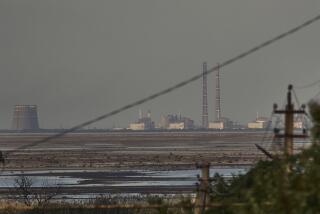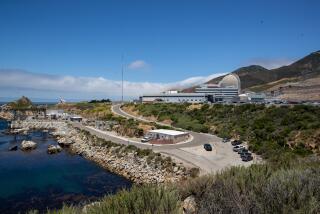Nation’s Oldest A-Plant Shut Down Over Safety : Radiation: Federal regulators express concern over the strength of the reactor’s steel pressure vessel.
- Share via
WASHINGTON — The owner of the nation’s longest-operating nuclear power plant announced Tuesday that the reactor is being shut down after the staff of the Nuclear Regulatory Commission expressed concern about the safety of the steel pressure vessel surrounding its core.
The staff’s findings on the Yankee Rowe facility were to have been presented at a meeting of the NRC here today, along with a recommendation that the reactor be ordered to suspend operations. But only hours after being informed of the report, Yankee Atomic Electric Co. said that it was voluntarily shutting down the plant in western Massachusetts.
In operation for nearly 31 years, Yankee Rowe is less than nine years from the expiration of its operating license. Many had expected that the plant would be the first of the nation’s early nuclear plants to seek a formal extension of its operating lifetime.
Questions about the plant’s safety have been furiously debated for months. Critics maintain that the years of exposure to intense neutron radiation have made the reactor vessel brittle and susceptible to fracturing under certain circumstances, possibly releasing seething radiation or even leading to a meltdown of the core.
NRC Chairman Ivan Selin hailed Yankee Atomic’s decision to shut down voluntarily, saying that the company had “acted very responsibly.” Officials said that the reactor will remain out of service pending additional technical studies and will not restart without the commission’s approval.
Last July, in the face of critics’ efforts to force a shutdown of the plant, the NRC staff insisted that the reactor could continue to operate safely until its next scheduled refueling next April. The commission rejected a petition for an immediate shutdown.
But in its new report to members of the four-man commission, staff experts said that new analyses had “substantially reduced the staff’s confidence” in its earlier, more conservative calculations about the condition of the reactor vessel. As a result, the commission “recommended that the Yankee Rowe nuclear power station be shut down until the NRC is satisfied that the . . . pressure vessel has adequate margins against failure during operation.”
Robert Pollard, a one-time NRC safety engineer who has become a sharp critic of the nuclear industry with the Union of Concerned Scientists, hailed the new staff recommendation as a vindication of the position taken by critics. “It is a dramatic reversal resulting from using a much more realistic computer model,” he said.
With its record as one of the country’s most successful nuclear generating stations, Yankee Rowe and the Monticello nuclear reactor in Minnesota had been used by the Department of Energy as pilot cases in addressing the problems of extending the lives of older nuclear plants.
Until attention was focused on the potential brittleness of the reactor vessel, Yankee Atomic had planned to submit this year a formal application to extend the plant’s operating license for 20 years after expiration of its original 40-year license in the year 2000.
The problem of assessing the condition of the Yankee Rowe reactor vessel has been extraordinarily difficult because fabrication techniques used at the time it was created made it impossible to take samples to inspect for microscopic cracks.
The vessel, which is 33 feet tall, 9 feet in diameter and 8 inches thick, is filled with water and encloses the reactor core, which generates steam to drive electrical turbines.
The primary concern has been that the vessel could crack if emergency cooling water were injected during an accident, dramatically changing its temperature. That possibly could release radioactive steam, but company officials have always maintained that the containment building would prevent it from reaching the atmosphere or endangering the residents of the community of Rowe, several miles away.
More to Read
Sign up for Essential California
The most important California stories and recommendations in your inbox every morning.
You may occasionally receive promotional content from the Los Angeles Times.













